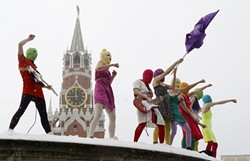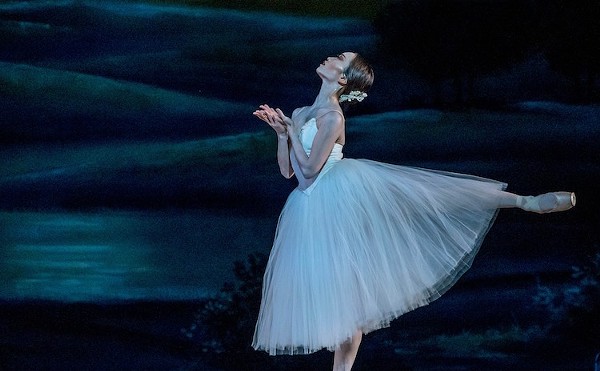****
Pussy Riot: A Punk Prayer - Mike Lerner, Maxim Pozdorovkin (2013) Because of its Special Jury Award for "Punk Spirit" at Sundance earlier this year, I held out high hopes for Pussy Riot: A Punk Prayer, a documentary focusing on the radical Russian feminist punk band before, during and after their arrest and trial in Moscow in 2012. The film turns out to be something of a let down though, less informative than most articles and blogs despite the insider access it enjoyed. It's key moments boil down to the few minutes of footage of the band members in their courtroom cell talking about their predicament while an endless line of photographers are paraded by for a snapshot of the dangerous trio. But the film lacks a rounded, well-researched throughline to unite the various thoughts the directors and its subjects put forward, ending up more a collection of images than a documentary of biting substance. The directors, Mike Lerner and Maxim Pozdorovkin, seemed to get sucked into the media and celebrity circus that surrounded the case and, like Occupy Wall Street, the ideals that were the driving forced behind the band (aka: the point of the band and the documentary) become lost in the din of shutter clicks and girls in balaclavas shouting into their webcams. The film is anchored by the personalities of Nadia, Masha and Katya -- the only three known members -- but performs only a minor biography on them before settling in for an almost formal court procedural. Lerner and Pozdorovkin compare it to the Russian show trials of the 1930s, but they do it without any particular conviction, perhaps because the actual show trials ended in summary execution immediate after. Are Nadia, Masha and Katya more important as individuals in a documentary than the ideas they're fighting for? Should one take precedence over the other, or is one so firmly rooted in the other that they are inseparable from each other? That's always the hardest thing to balance in a political documentary. Even though the argument could be made that the individuals don't matter, we don't tend to identify with an isolated idea as strongly as we do with people who have an idea. Like other issues in the film, the directors seem to run their toes along the middle ground, not making a firm choice one way or the other. My feeling is that in 5-10 years, someone is going to make a legitimately good documentary about this dreadful farce of a trial -- one that should have ended in a fine and a stern lecture (to which the girls should have rolled their eyes at as proper punks) -- but the wound is still too raw to make for a good picture right now. (Available on HBO GO.) http://www.youtube.com/watch?v=WUjA_hcYzzI http://www.youtube.com/watch?v=4QzblZ-Dg0U
We Steal Secrets: The Story of WikiLeaks - Alex Gibney (2013)
There is a scene in Mel Brooks' Spaceballs when Dark Helmet and Col. Sanders decide to find Lonestar by watching a copy of Spaceballs: The Movie even though they're in the middle of making it. It's one of the best movie bits Brooks ever came up with, and it seems to have a modern parallel coming true. Were documentaries always this quick to be captured, processed and released? The story that director Alex Gibney has set his sights on here -- the website WikiLeaks and the cult of personality that sprung up around its' leader, Julian Assange -- is still actively unfolding. Even though Gibney's film takes the longview, tracing Assange back to his hacker youth in 1980s Melbourne, at the end of the film we're looking at now now: Assange, frail and emotionally (and ethically) compromised, as a refugee in the Ecuadoran embassy in London, where he remains to this day, still fighting his extradition to Sweden on sexual assault allegations which he fears will lead to extradition to the United States.
WikiLeaks started from a noble idea, that a well informed society is better than nanny state, but because of the pressure applied by the governments who were targets in the leaks and the personal failings of its founder, it eventually strayed off course. WikiLeaks became synonymous with Assange himself, with, it's alleged, much of the site's funding going to Assange's legal defence, leaving Assange with few allies, and Bradley Manning -- the Private who actually leaked the trove of documents and videos -- mostly abandoned to a cruel military justice system.
The only problem is that if you've been paying attention even a little bit, you know all of this stuff already. That's a problem of time and distance, which Gibney has not allowed enough of. The story is still fresh in our minds and so covered by so many journalists around the world that We Steal Secrets breaks no real news in its two plus hour running time. This is, at this time, essentially advanced reblogging for profit. Gibney's interest in the subject may be sincere, but it's not discovery of a subject. (Available to download on various platforms.)

WE LOVE OUR READERS!
Since 1990, Orlando Weekly has served as the free, independent voice of Orlando, and we want to keep it that way.
Becoming an Orlando Weekly Supporter for as little as $5 a month allows us to continue offering readers access to our coverage of local news, food, nightlife, events, and culture with no paywalls.
Scroll to read more Arts Stories + Interviews articles
Newsletters
Join Orlando Weekly Newsletters
Subscribe now to get the latest news delivered right to your inbox.

















